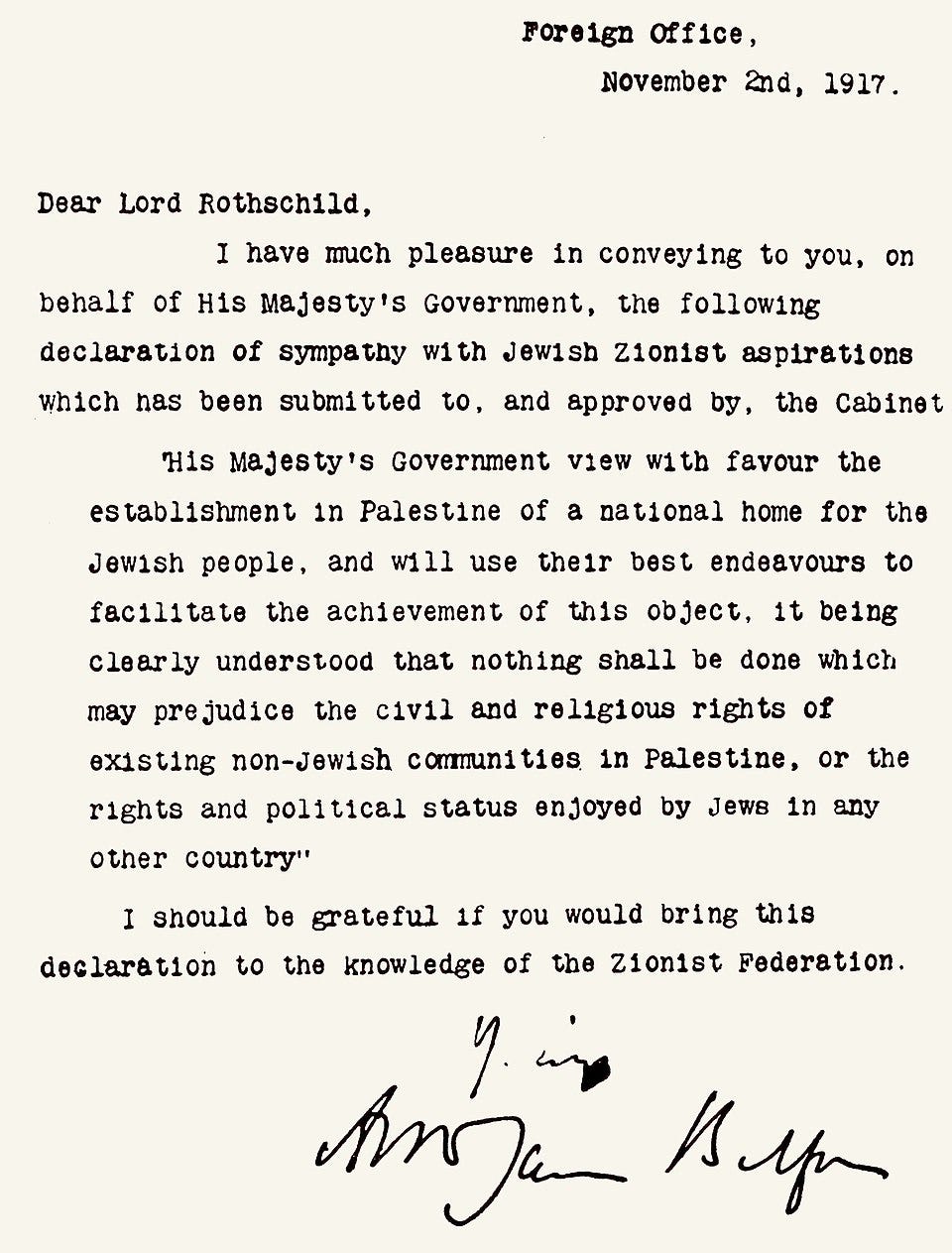Reading The Balfour Declaration In 2025
It's one of the most important documents in Palestinian history
The Balfour declaration was a statement issued by the British government during World War I, on November 2, 1917 that expressed support for the establishment of a "national home for the Jewish people" in Palestine, which was then part of the Ottoman empire.
In Palestinian culture and online spaces, this document is about as popular as cholera, leprosy, or toenail fungus.
It is seen as the start of a century-long process of dispossession and displacement. Palestine in the 1910s was a land where non-Jewish people (predominantly Muslim Arabs) made up more than 90% of the population.
Let’s see what the declaration actually said—which is very easy, because it is very short:
First of all, I think it’s important to point out that Britain didn’t even have control of the land at the time. It was merely a suggestion from the British empire towards the Ottoman empire. And this only changed after World War I when Britain won control of the region from the Ottomans.
The declaration was quite vague about key issues. It spoke of a “national home” for Jews but did not define whether that meant statehood, autonomy, or something else.
On the rights of the non-Jewish people of the land—the people who we would refer today to as Palestinians, including my ancestors—it offered an assurance that “nothing shall be done which may prejudice the civil and religious rights of existing non-Jewish communities”.
In a world that at the time remained dominated by empires and colonial interests, it was no small thing for a major power to acknowledge, even in limited language, the civil and religious rights of a subject population. The Balfour Declaration might thus be read not only as a promise of support to the Zionist movement but also as an early—albeit limited—attempt to envision a shared future in the land where Palestinians and Israelis could live side by side either in 1 state, or in 2 states.
Had its terms been implemented in good faith, the declaration might have served as a framework for coexistence between two peoples—the Jews, and the Palestinians—who both had ancient, cultural, and emotional ties to the land. It was not inevitable that it would lead to conflict. The tragedy lies in how it was ultimately overshadowed by later events: rising competing nationalisms, and cycles of violence that ended in partition, war, and mass displacement.
I see it above all else not as some sinister colonial document that harmed Palestinians, but as a missed opportunity. Both the Zionists and the Palestinians had some right to exist alongside one another, and I still believe the same is true today. Neither side is going to disappear.
What has gone wrong is a continuation of militancy, escalation, and people seeking revenge against one another, powered by increasingly radical ideologies like jihadism and Kahanism that dehumanise the people on the other side.
When will this end? I believe it will end when leaders and populations have the maturity to look across and accept that the other side are not going to disappear, and we instead need to discover a way to build a better future together, one in which neither Israelis nor Palestinians are dying or being subjected to violence or subjugation. We need to negotiate and talk our way out of this mess.
The seeds for this approach existed 100 years ago.
It is incumbent upon us to take action and fix it, step by step, hour by hour, moment by moment.



You do forget the actual attempted outcome, which was partition, like between India and Pakistan. The difference is that the Jews said yes and the Arabs said no.
There was no Kahanism in 1948 and there is very little of it today. Equating that ideology with islamism is disingenuous. There was a huge peace movement in Israel until the 2nd intifada. The people slaughtered on October 7 were the peaceniks. If Israel is turning away from a 2 state solution Palestinians have no one to blame but themselves.
The entirety of Palestinian society rejects the existence of Israel. Always has going all the way back to Grand Mufti Husseini. Look at the polling.
Sure there might have been the Irgun in 1948 but they were not interested in stopping the creation of a Palestinian Arab state. They were only interested in creating a Jewish one and protecting the Jewish citizens from the muftis fedayeen and Arab armies. Sure they bombed the British and innocents died, but they did not become the army of Israel the Haganah did. To understand the Irgun you need to read Jabotinsky. Nothing like islamism.
It seems to me that the Arabs who remained in Israel post-statehood without attacking their Jewish neighbors do enjoy living side-by-side in peace and citizenship today. That was the fulfillment of the Balfour Declaration.